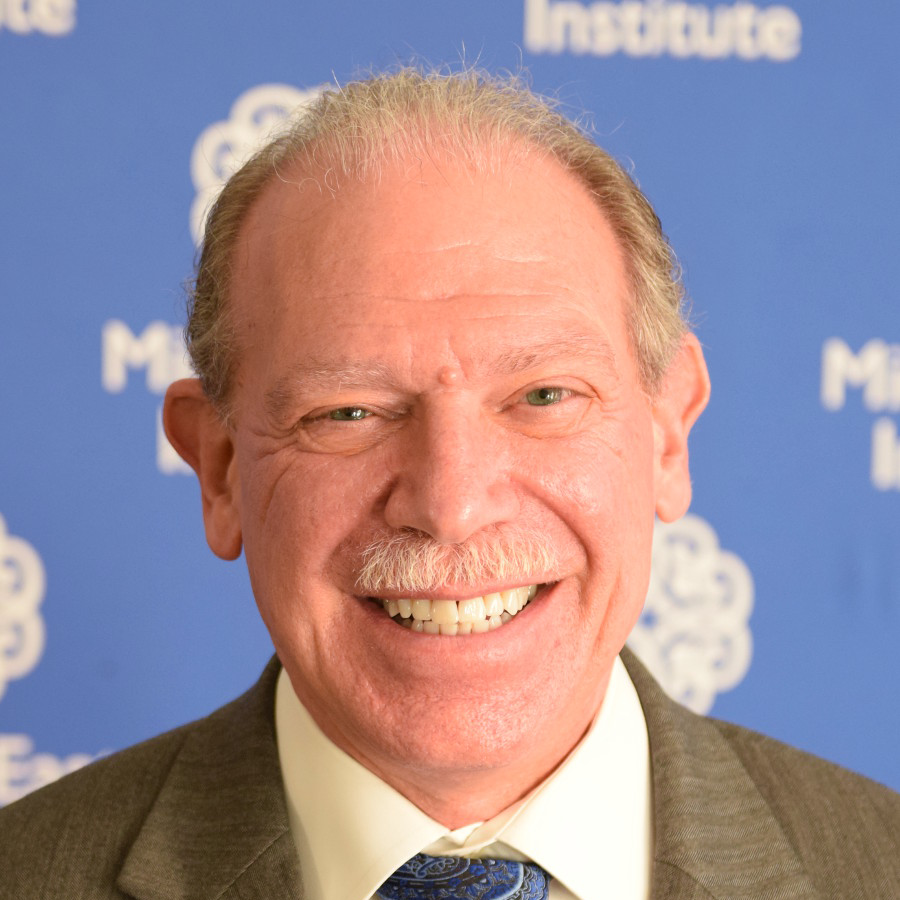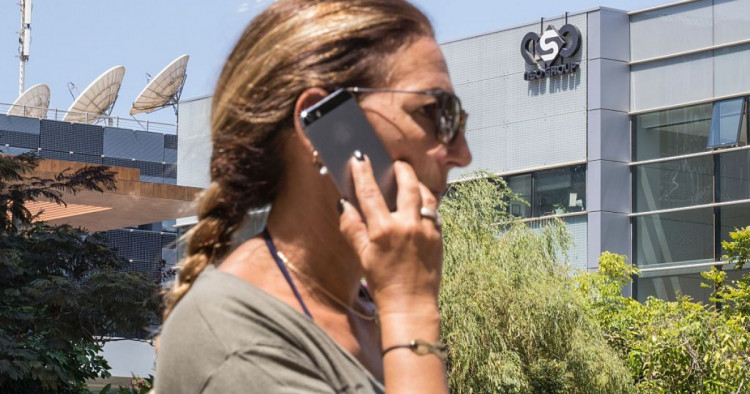Contents:
- Massive leak shows NSO Group’s reach throughout the Middle East
- King Abdullah arrives in Washington looking for a reset
- OPEC+ reaches compromise production deal
- Hariri has (finally) stepped down. Here’s what happens next.
Massive leak shows NSO Group’s reach throughout the Middle East
Eliza Campbell
Associate Director for Impact and Innovation and Acting Director, Cyber Program

Adding substantial fuel to the fire of a years-long controversy, new reporting about the Israel-based company NSO Group shows that at least 50,000 persons of interest, including more than 180 journalists, have been targeted by clients of the company’s hacking spyware, Pegasus. The reporting, part of an investigation by a cohort of media organizations, sheds light on the depth of complicity between authoritarian governments, including many in the Middle East, and the Israel-based company, which is part of a controversial market for tools that can be used to surveil private communications. Although NSO Group and other spyware companies maintain that their tools are designed to be used only to target criminals and terrorists, years of evidence have shown that NSO’s hacking spyware, Pegasus, is used in many instances primarily to harass, target, and surveil journalists, human rights activists, and lawyers, particularly in countries where freedom of speech and communications are restricted.
The leak of 50,000 mobile numbers suspected, though not confirmed, to be targets of the Pegasus software, was originally made available to Amnesty International and the French nonprofit Forbidden Stories. The two organizations shared the information with a consortium of media outlets, whose collective reporting is known as the Pegasus Project. More names of targeted individuals are expected to be released in the coming days, and include “hundreds of business executives, religious figures, academics, NGO employees, union officials, and government officials,” as well as close family members of one country’s ruler. Meanwhile, the governments of Saudi Arabia, Qatar, Morocco, Bahrain, Egypt, Lebanon, Turkey, and Algeria were reported to be clients of NSO, with several already confirmed to have targeted journalists and activists using Pegasus. The reporting also shows that the phones of at least three people close to murdered Saudi columnist Jamal Khashoggi, including his wife, were penetrated with NSO spyware shortly after his murder.
The coming days promise to shed more light on the specifics of who may have been targeted by NSO’s technology, as well as how and why particular institutions or individuals were targeted. These revelations also raise questions about Israel’s role and complicity in failing to regulate a company, and a wider industry, that appears to be doing substantial harm to civil society and civil liberties throughout the region and beyond. This development also has significant implications for growing tech diplomacy between Israel and its neighbors, particularly Gulf states whose governments are notorious NSO clients. Although cooperation on paper, particularly in the form of the much-celebrated Abraham Accords, may be superficially positive in the short run, more discerning observers will watch how de facto cooperation in the form of business partnerships and the buying and selling of technology designed to be used for distinctly political purposes, may tell a different story.
King Abdullah arrives in Washington looking for a reset
Gerald M. Feierstein
Senior Vice President

Jordan’s King Abdullah will meet with President Joe Biden today, the first leader from the Middle East region to do so, looking to repair the strains in the bilateral relationship suffered over the past four years. He will find in the new administration a team that is much more closely oriented toward his perspective on regional issues than was its predecessor.
In particular, the king’s views on Israel-Palestine ran counter to the Trump administration’s vision of the “Deal of the Century” not only in regard to the recognition of Jerusalem as the undivided capital of Israel but also in pressuring the Palestinians. The Trump administration’s decision to cut U.S. assistance to UNRWA was especially damaging to Jordan, which depended on the assistance to offset their costs associated with aiding Palestinian refugees. Reports that the administration favored replacing Jordanian supervision of the Haram al-Sharif/Temple Mount with a Saudi role added insult to injury for the Hashemite rulers of Jordan.
None of those issues will trouble the king’s relations with President Biden. Moreover, he will almost certainly find a sympathetic audience in Washington for his appeals for support on Jordan’s domestic economic troubles, the burden it is bearing providing for Syrian and Iraqi as well as Palestinian refugees, and his views on the larger problems of the region.
For the Biden administration, re-connecting with the Jordanians will provide an opportunity to map a way forward on the Israel-Palestine issue and could provide a useful sounding board for ideas on dealing with both Jerusalem and Ramallah. The Jordanians can also provide important support for the administration in Syria and Iraq. With the administration confronting the potential fallout from its Afghanistan departure this year, having a stable, reliable partner in Amman can be an important support for President Biden in the region.
OPEC+ reaches compromise production deal
Karen E. Young
Senior Fellow and Director of Program on Economics and Energy

A compromise was reached between OPEC and its partnering countries (OPEC+), most importantly including an increase to the UAE's baseline production starting in May 2022 at 3.5 million barrels per day (mbpd), up from its current level of 3.17 mbpd. Under the new deal, OPEC+ countries will raise output by 400,000 bpd on a monthly basis from August 2021 and continue until the current 5.8 mbpd production cuts are fully restored. The deal extends to December 2022. And the UAE was not the only country to increase its baseline production level: Kuwait, Saudi Arabia, Russia, and Iraq also gained the ability to export more under the extended agreement, starting in May 2022.
The abrupt breakdown of the OPEC+ talks earlier in July led to broader questions about the nature of Gulf Arab states' oil production capacity and horizons for export targets now while oil prices are quite strong, with the understanding that the current tight market will not be a long-term phenomenon. The UAE and Saudi Arabia have rarely had such a public disagreement on policy matters, whether economic or political in nature. The outcome is a return to the framework agreement in place since December 2016, in which OPEC members plus a number of other key producers, namely Russia and Mexico, have put production cuts in place to try to buoy oil prices since the advent of U.S. shale production. What has changed since late 2016 is, of course, the COVID pandemic, which devastated global oil demand, and a more pressing international policy landscape targeting reduced carbon emissions. Many analysts see global oil demand growth in the second half of 2021 outpacing supply, even with these production increases scheduled. However, this tight oil market has a number of wild cards that could shift price expectations, as COVID variants may dampen demand in Asia and slow down the revival of global travel, and the resolution of the U.S. and Iran negotiations by year end could bring some significant Iranian oil products to market. The difficulty for Middle East oil producers is aligning the current strong demand for their products with medium- and longer-term growth expectations and fiscal spending plans. Neither OPEC+ cooperation, nor the exact timing of oil demand have clear expiration dates, but both could be just a matter of time.
Follow on Twitter: @ProfessorKaren
Hariri has (finally) stepped down. Here’s what happens next.
Christophe Abi-Nassif
Director, Lebanon program

Unsurprisingly, Lebanon’s Prime Minister-designate Saad Hariri abandoned his efforts to form a cabinet last week after nine months of bickering and paralysis. Politically, and despite shifting and more fragmented domestic alliances, the status quo hasn’t changed much. Socio-economically and financially though, Lebanon is in free fall. On the first day of Hariri’s nomination last October, the U.S. dollar changed hands for 7,000 Lebanese pounds. Today, that rate has exceeded 22,000. Along the way, billions of dollars of foreign currency reserves have been unproductively squandered or syphoned out of the country with no strategic economic and financial vision in place.
Lebanon today faces one of three options. The base case absent any political breakthrough — or imposed solution — consists of a dangerously accelerating socio-economic collapse, social unrest, and security threats. Under this option, the impotent caretaker government led by Hassan Diab will continue operating in a political vacuum with no agency, ability, or credibility to counter the multiple crises. More poverty, and by extension more sectarian clientelism and entrenchment, will ensue, feeding directly into establishment parties’ electoral interests.
The second option entails the nomination of a consensus candidate in line with Lebanon’s destructive post-2008 consensual democracy. In this case, establishment parties will scramble to find a bland candidate that is acceptable by Hariri, President Michel Aoun, Hezbollah, and the myriad foreign players involved in the Lebanese political stalemate. This attempt would nevertheless recreate a Diab 2.0 government, unable to carry out much-needed reforms — the antithesis of the current establishment’s vested interests. In an attempt to appeal to growing Sunni frustration and discontent — Lebanese prime ministers are, by perverse design, Sunni, and often the first to lose their shirt in times of crises — a variant of this option would reintroduce shopworn “representative” figures such as former Prime Minister Najib Mikati. President Aoun has called for mandatory parliamentary consultations on Monday, July 26, but the country isn’t holding its breath.
If there’s one thing that international partners have hopefully learned by now, it’s that banking on Lebanon’s political establishment to craft a way out of the country’s crises is futile and in fact harmful. The 266 days that Lebanon has lost in its self-inflicted logjam are a flagrant case in point. Therefore, the third and only viable option remains a truly independent and competent transitional government (head and members) with exceptional legislative powers, able and willing to implement reforms and manage the collapse. Entertaining other options will continue to waste more precious time. It is game over for Lebanon’s political establishment and broader system of governance. The faster Lebanon’s politicians realize and accept this fact, the less painful and damaging it will be for everyday Lebanese citizens and future generations.
Follow on Twitter: @chris_abinassif
Photo by JACK GUEZ/AFP via Getty Images
The Middle East Institute (MEI) is an independent, non-partisan, non-for-profit, educational organization. It does not engage in advocacy and its scholars’ opinions are their own. MEI welcomes financial donations, but retains sole editorial control over its work and its publications reflect only the authors’ views. For a listing of MEI donors, please click here.













